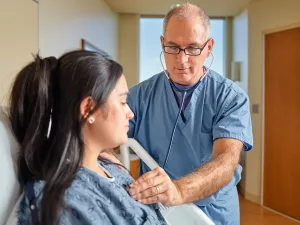Heart disease symptoms and risk factors can be different for women than for men. That’s why the sex you were assigned at birth plays an important role in detecting heart disease. Our experts are dedicated to caring for women and those assigned female at birth (AFAB) who are living with heart disease or are at risk. We prioritize your health history and personal goals to create a wellness plan that fits your needs.
Helping women get the heart care they deserve
Heart disease affects women and those assigned female at birth (AFAB) differently, so it’s important to get care that meets your specific needs. Our team is here to support women and AFAB individuals at risk of heart disease or living with it. We focus on understanding your health history and goals to create a plan that works for you.
On average, women develop heart disease about 10 years later than men, especially after menopause. But risk factors like obesity, diabetes and smoking can affect heart health earlier. Differences in cholesterol, hormones and blood pressure also play a big role. Hormone replacement therapy adds another layer of complexity. Women and AFAB individuals can trust that their treatment plan will be compassionate, personalized and based on the latest heart health research.

Conditions
We're dedicated to evaluating and treating cardiovascular conditions in women and AFABs, especially:
We encourage women to talk with their doctors regularly about their heart health and the preventive steps they can take to reduce potential risks. Certain conditions and lifestyle choices can heighten a woman's risk of heart disease, including:
- Diabetes
- Family history of early-onset coronary artery disease
- Gestational diabetes
- Heart problems during pregnancy
- High blood pressure
- High cholesterol
- Smoking

Women + heart attacks
When many of us think about heart attacks, we picture what we see in the movies—severe chest pain and left arm pain. While these are common symptoms of heart attacks, women often experience additional or different warning signs or sometimes no symptoms at all. Common heart attack symptoms in women include:
- A sudden cold sweat
- Back, neck or jaw pain
- Chest pain, pressure or discomfort
- Lightheadedness or dizziness
- Nausea or vomiting
- Shortness of breath
- Stomach pain
These symptoms can be more subtle and are often mistaken for other conditions like stress, anxiety or indigestion. Because of this, women may wait longer before seeking care. But every second counts when it comes to heart health. If you suspect a heart attack, don’t wait—seek medical help right away.
Testing
We’re dedicated to evaluating and treating heart conditions in women and AFAB individuals, especially with cardiovascular imaging and noninvasive testing, including:
- Cardiac MRI: Uses magnetic fields and radio waves to create detailed images of the heart and blood vessels. This helps detect damage or issues within the heart.
- CT scan: Provides detailed images of the heart and blood vessels. It’s particularly useful for identifying blockages or narrowing in the coronary arteries.
- Echocardiogram ("echo"): Uses ultrasound to create images of the heart, with 3D echocardiography providing highly detailed views from different angles.
- Electrocardiogram (EKG): Measures the electrical activity of the heart. It helps detect irregular heart rhythms or damage to the heart.
- Stress echocardiogram: Combines an echocardiogram with a stress test to see how well the heart functions under physical stress. This test can identify problems that might not show up at rest.
- Nuclear cardiac imaging: Uses safe radioactive material to create images of the heart, identifying areas with reduced blood flow or other issues.
Treatments
The most important thing women and AFABs can do for themselves is to understand their bodies. Our care teams are here to support women and AFABs throughout their wellness journeys, providing clear explanations of each treatment plan. This includes cardiovascular risk assessment and prevention, including management of lipid disorders, hypertension and other risk factors. When women and AFABs are informed about their options, we believe they can make the best healthcare choices.
The good news is that women and AFABs can take steps to stay ahead of their heart health. We call this preventive cardiology, which may include helping women manage:
- Cardiovascular care during pregnancy
- Cardiac surgery or interventional cardiology procedures such as angioplasty, stenting or valve replacements, if needed
- Lifestyle changes, including exercise, nutrition, quitting smoking, stress management and sleep
- Management of heart disease in women, including coronary artery disease, cardiomyopathy, heart failure and cardiac arrhythmias
- Medications to manage blood pressure, cholesterol and reduce blood clot risks
- Regular heart health monitoring through tests like blood pressure and cholesterol checks
Locations

From regular office visits to inpatient stays, find the healthcare you need and deserve close to home.

Meet the doctors and care team devoted to supporting you every step of the way along your path to better health.